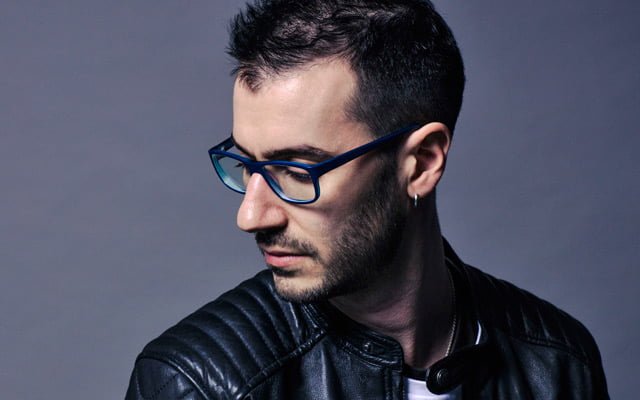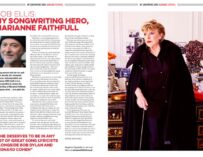
SK Shlomo: “Learning to zoom out and remember the fun and passion that originally motivated us can be a lifesaver.” Pic: Nathan Gallagher
The world-record-breaking beatboxer shares advice on creativity and mental health from Björk, Damon Albarn, Ed Sheeran, Jason Mraz and more
It’s no secret that creative people and mental health struggles go hand in hand, and I’ve had my share of highs and lows. I remember performing on the Pyramid Stage at Glastonbury, a massive dream of mine, and walking offstage feeling empty inside. Now what? Now I’d have to find something even bigger to do.
That impossible drive to keep on pushing myself, to break more world records, or to finally become “perfect” was getting more and more unhealthy until a terrifying suicidal breakdown in 2017 scared me enough to pause the whirlwind and get help.
I’m so glad I did, asking for help and being open about my journey has transformed my life, and I’m now about to release my debut album which raises mental health awareness.
Here are some things I’ve learnt from the guests on my monthly mental health live stream #WEARELISTENING, and from a decade of collaborations with artists I’ve been lucky enough to know…
10 tips for good songwriting mental health
1. Learn to breathe again
Jason Mraz taught me that singing can be a meditation, a form of conscious breathing to keep you grounded in the here and now instead of getting lost in fear and worry for the past or future. Your breath and your heartbeat are the one constant that has always been with you, night and day, no matter how crazy your experience of the world.
2. Believe in yourself
Performing with Ed Sheeran taught me about self-belief. Of course, we will all have confidence wobbles, and our successes will sometimes provoke jealousy and disapproval, but progress comes from staying faithful to your own vision. Learning to be your own champion, and supporting yourself through all the highs and lows can lead to a great sense of achievement – and in Ed’s case – world domination.
3. You’re not alone
Kodaline’s open and candid description of crippling anxiety attacks on the road reassured me that I’m not the only one suffering – even though mental health struggles are awful, they are also normal. The more we talk about our fears and worries, the closer we get to the people around us, the safer we feel and the less control those anxieties have over us.
4. Embrace your inner weird
Working with Björk taught me that you don’t have to compromise on your vision for anyone. Summoning the courage to stand up and tell your own story, sing in your own voice rather than try to be like everyone else, will sustain you through any passing trends or fads.
5. Remember to laugh
Bill Bailey taught me how humour, honesty and not taking other people’s opinions of you too seriously can help you build a healthy self-image and overcome self-doubt. When making music is a huge part of our lives, we can end up feeling as if there is genuine danger when the creative process isn’t going to plan. Learning to zoom out and remember the fun and passion that originally motivated us can be a lifesaver.
6. Diversify or die
Damon Albarn taught me that reinvention is essential. His incredibly eclectic choice of projects has kept him both artistically and commercially successful around the world for over 20 years. Performing a spontaneous collaboration at Glastonbury with Damon, The Specials and a bunch of African artists including Amadou & Miriam showed me that the unstoppable feeling of raw expression has no regard for rules or genres, so why do we feel we have to stick to just one style?
7. Fun comes first
Jamming with Jarvis Cocker and Leslie Feist on a boat floating in the Arctic sea was a surreal experience. We were there to learn about the effects of climate change, and to find inspiration to create work raising awareness. Whilst we were out there, we formed an impromptu supergroup called Arctic Lofi, with myself beatboxing, Feist on a tiny battery-powered electric guitar and Jarvis scratching records on a Fisher Price turntable. We had a blast, and I believe with anything creative, fun has to come before anything else – yes there has to be discipline and practise, but our own delight is the ultimate motivator.
8. Keep tech simple
KT Tunstall still uses the same original Headrush delay pedal for her live looping that she did when her career first started. After I became World Looping Champion, I started being sent new kit and I got the bug for making my setup more and more complicated. My looping rig still is pretty complex, but collaborating with KT reminded me that you don’t need all of the toys in the world to create incredible music.
9. Stand up for a cause
Rudimental and Lily Allen taught me to use my voice. When they joined me and over 50 drummers at my Glastonbury show to break the Glasto Drumming Record, we united for a cause – to raise awareness of the White Ribbon Alliance – a campaign to reduce death in childbirth around the world. Music is a powerful way to communicate a message, so let’s embrace our powers as artists and influencers to stand up for the causes we believe in.
10. Don’t look away
After all these collaborations I still felt clueless. In the end, I had to learn to trust my own wisdom. I finally stopped resisting my yearning to become a solo recording artist, and the process of facing my fears took me to a seriously dark place. But on this journey, I learned that if I didn’t learn to face my truth, even though it hurts, I would literally disappear off this planet. Pretending to be okay, to ourselves or others, is something we all do but any opportunity we can take to chip away at that habit will lead to greater happiness, success and ultimately, more music, love and human connection in this neurotic but beautiful thing we call humanity.




































Related Articles